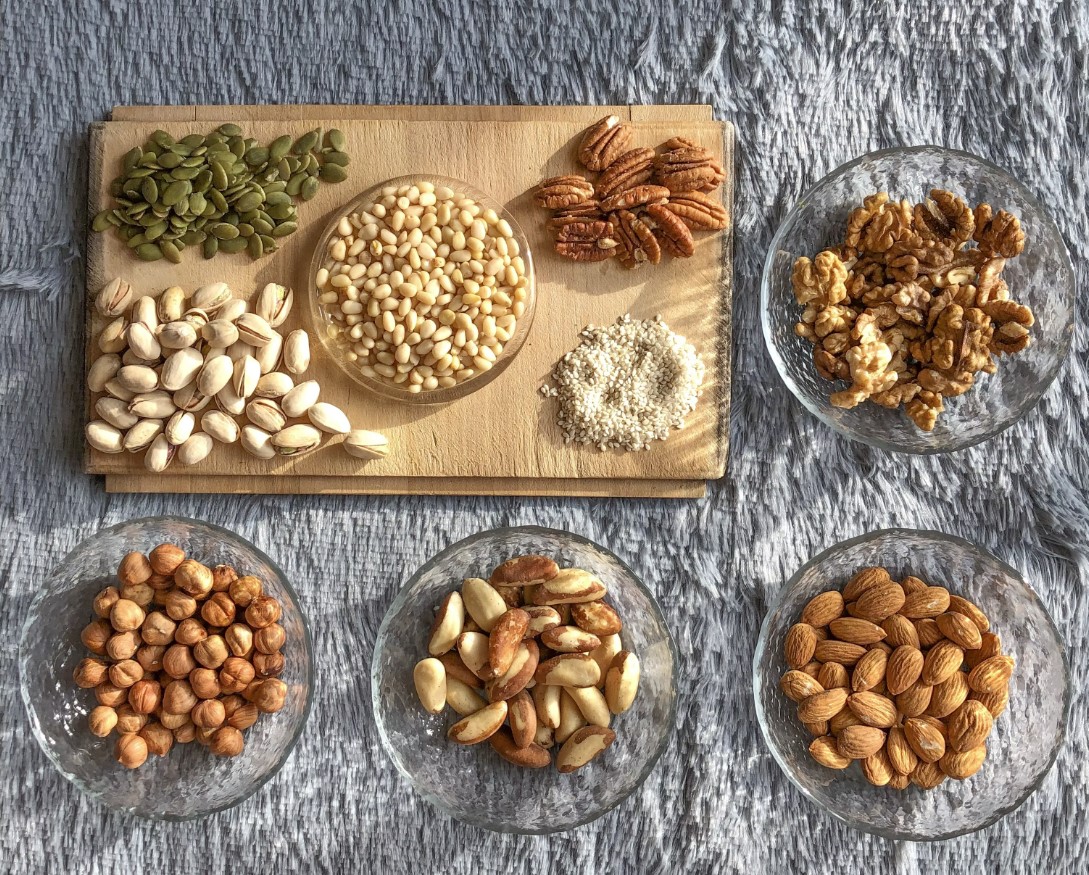Nuts are a delicious and nutritious snack that are packed with a variety of health benefits. From almonds to walnuts, there are many different types of nuts to choose from, each with their unique nutritional profiles and health benefits.
Here are some of the different nuts and their benefits:
- Almonds: Almonds are a good source of healthy fats, fiber, and protein. They are also high in vitamin E, magnesium, and antioxidants, and have been shown to reduce inflammation and improve heart health.
- Brazil nuts: Brazil nuts are a good source of selenium, a mineral that is essential for thyroid function. They are also rich in healthy fats, fiber, and protein, and have anti-inflammatory properties.
- Cashews: Cashews are a good source of healthy fats, copper, and magnesium, which are essential for heart health and energy production. They are also high in antioxidants and have anti-inflammatory properties.
- Chestnuts: Chestnuts are lower in calories and higher in carbohydrates than other nuts. They are also a good source of fiber, vitamin C, and potassium, and have been shown to improve blood sugar control and reduce inflammation.
- Hazelnuts: Hazelnuts are high in monounsaturated fats, which are beneficial for heart health. They are also a good source of vitamin E, folate, and minerals such as potassium, calcium, and magnesium.
- Macadamia nuts: Macadamia nuts are rich in monounsaturated fats, which are beneficial for heart health. They are also high in antioxidants, fiber, and minerals such as magnesium, calcium, and potassium.
- Pecans: Pecans are high in antioxidants, healthy fats, and fiber, and have been shown to reduce inflammation and improve heart health. They are also a good source of minerals such as manganese, copper, and zinc.
- Pine nuts: Pine nuts are a good source of healthy fats, protein, and fiber, and are also rich in vitamin E and minerals such as magnesium, potassium, and zinc. Eating pine nuts has been shown to reduce appetite and promote weight loss.
- Pistachios: Pistachios are high in antioxidants, fiber, and healthy fats, and have been shown to reduce inflammation, improve heart health, and promote weight loss. They are also a good source of vitamin B6, copper, and manganese.
- Walnuts: Walnuts are high in omega-3 fatty acids, which are beneficial for heart health and brain function. They are also a good source of fiber, antioxidants, and minerals such as magnesium, phosphorus, and copper.
- Peanuts: Peanuts are high in protein, fiber, and healthy fats, and are also rich in vitamins and minerals such as vitamin E, magnesium, and phosphorus. Eating peanuts has been shown to reduce inflammation, improve heart health, and promote weight loss.
- Pili nuts: Pili nuts are high in healthy fats, fiber, and minerals such as magnesium, calcium, and potassium. They are also low in carbs and have a high smoke point, making them a good option for cooking.
- Sesame seeds: Sesame seeds are a good source of healthy fats, fiber, and protein. They are also rich in vitamins and minerals such as vitamin E, calcium, magnesium, and iron.
- Flaxseeds: Flaxseeds are high in omega-3 fatty acids, fiber, and lignans, which are antioxidants that have been shown to reduce inflammation and improve heart health. They are also a good source of protein and minerals such as magnesium, phosphorus, and manganese.
- Sunflower seeds: Sunflower seeds are a good source of healthy fats, fiber, and protein. They are also rich in vitamins and minerals such as vitamin E, magnesium, and selenium, and have anti-inflammatory properties.
- Chia seeds: Chia seeds are high in fiber, healthy fats, and protein, and are also rich in antioxidants, vitamins, and minerals such as calcium, magnesium, and iron. They have been shown to improve heart health, blood sugar control, and digestive health.
- Watermelon seeds: Watermelon seeds are high in healthy fats, fiber, and protein, and are also rich in minerals such as magnesium, iron, and zinc. Eating watermelon seeds has been shown to improve heart health, digestion, and blood sugar control.
- Ginkgo nuts: Ginkgo nuts are high in antioxidants, healthy fats, and fiber, and have been shown to improve cognitive function and reduce inflammation. They are also a good source of vitamin E and minerals such as magnesium, phosphorus, and zinc.
- Lotus seeds: Lotus seeds are a good source of healthy fats, protein, and fiber, and are also rich in vitamins and minerals such as iron, zinc, and calcium. They have been shown to improve heart health, digestion, and cognitive function.
- Hickory nuts: Hickory nuts are high in healthy fats, fiber, and protein, and are also rich in vitamins and minerals such as vitamin E, magnesium, and phosphorus. They have been shown to improve heart health, digestion, and cognitive function.
While nuts offer many health benefits, there are also potential downsides to be aware of. Here are some things to keep in mind:
- Allergies: Nuts are a common allergen, and consuming them can cause reactions ranging from mild symptoms like hives and itching to life-threatening anaphylaxis. If you have a nut allergy, it is essential to avoid nuts and products containing nuts.
- Calories and weight gain: Nuts are high in calories and can contribute to weight gain if consumed in excess. To enjoy the health benefits of nuts without overindulging, aim to consume a small handful (about 1 ounce) as a snack.
- Phytic acid: Nuts contain phytic acid, an anti-nutrient that can impair mineral absorption in the body. Soaking nuts before consuming them can help reduce phytic acid levels and improve mineral absorption.
- Aflatoxins: Certain types of nuts, such as pistachios and peanuts, can be contaminated with aflatoxins, which are carcinogenic compounds produced by mold. To reduce the risk of aflatoxin exposure, choose nuts that have been properly stored and processed, and avoid consuming rancid or moldy nuts.
- Cost: Nuts can be expensive, especially if you choose organic or high-quality varieties. To save money, consider buying nuts in bulk or choosing lower-cost options like peanuts or almonds.
In conclusion, nuts are a nutritious and delicious snack that offer numerous health benefits. However, it is important to be aware of potential downsides, such as allergies, high calorie content, phytic acid, aflatoxins, and cost. By choosing high-quality nuts, consuming them in moderation, and being aware of potential risks, you can enjoy the many health benefits of this nutritious snack.




